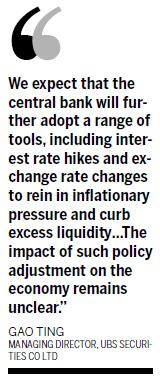Uncertainty over monetary policy tightening blamed for movements
SHANGHAI - China's stocks may endure continued volatility in the upcoming weeks in response to a lack of certainty regarding further tightening monetary policy, weighing on the major index that has retreated for four weeks.
China's benchmark Shanghai Composite Index cumulatively dropped by 1 percent by close of play last week, showing a loss of 6.6 percent in a month.

The central government on Friday set the tone for next year's policies by saying it will switch from a relatively loose monetary policy to a "prudent" one in 2011, while fiscal policies will become "proactive", according to Xinhua News Agency reports.
"We expect that the central bank will further adopt a range of tools, including interest rate hikes and exchange rate changes to rein in inflationary pressure and curb excess liquidityThe impact of such policy adjustment on the economy remains unclear," said Gao Ting, managing director of UBS Securities Co Ltd.
He noted that a volatile market will continue until concerns on monetary policy changes are well absorbed by the market.
The People's Bank of China, the country's central bank, hiked banks' reserve requirement ratios twice in November after raising its benchmark interest rate for the first time since 2007 in October to control asset bubbles and cool down the overheating economy.
Some economists expected that China will lift the interest rate for the second time by the year end as concerns on higher inflation grow. The nation's consumer product index (CPI), a main gauge of inflation, soared by 4.4 percent in October to reach a 25-month high.
The November CPI may increase by approximately 5 percent, Gao said. "The market has reached consensus for a higher CPI figure, which has already been reflected in recent stock market performances," he added.
Several officials from the central bank have recently signaled that China will steer its monetary policies back to normal in accordance with changes in food prices, liquidity and the pace of economic growth.
"After market corrections in the past two months, investors had seen an obvious decline in agricultural prices under the government's rigid control of food prices. We believe the inflation peak has passed, even though inflationary pressure has yet to ease," HSBC Jintrust Fund Management Co Ltd said in a research note on Friday.
The negative impact of policy concerns on stocks will gradually be eased in the upcoming three to four weeks.
Corporate earnings are expected to grow by more than 20 percent on China's strong economic expansion in 2011, Jing Ulrich, chairwoman of China equities and commodities with JPMorgan, said .





